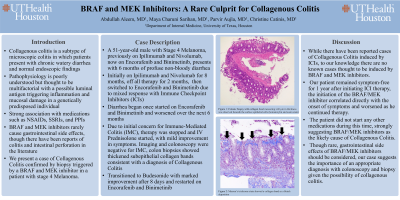Tuesday Poster Session
Category: Colon
P3066 - BRAF and MEK Inhibitors: A Rare Culprit for Collagenous Colitis
Tuesday, October 24, 2023
10:30 AM - 4:00 PM PT
Location: Exhibit Hall

Has Audio

Abdullah Sagar Aleem, MD
University of Texas Health Science Center
Houston, TX
Presenting Author(s)
Abdullah Aleem, MD1, Maya Sarihan, MD2, Parvir Aujla, MD1, Christine Catinis, MD, MS2
1University of Texas Health Science Center, Houston, TX; 2University of Texas Health Science Center at Houston, Houston, TX
Introduction: Collagenous Colitis is a disease of unknown etiology and primarily presents with non-bloody diarrhea. A form of microscopic colitis, the colon appears normal on colonoscopy and diagnosis is made via biopsy. While the etiology of Collagenous Colitis is up for debate, theories on a mix of both environmental and genetic factors are present, in addition, certain medications have been identified as potential triggers, including NSAIDs, SSRIs, and Proton Pump Inhibitors. BRAF and MEK inhibitors rarely cause gastrointestinal side effects, though there have been reports of colitis and intestinal perforation in the literature. We present a case of Collagenous Colitis confirmed by biopsy triggered by a BRAF and MEK inhibitor in a patient with stage 4 Melanoma.
Case Description/Methods: A 51-year-old male with Stage 4 Melanoma, previously on Ipilimumab and Nivolumab, now on Encorafenib and Binimetinib, presents with 6 months of profuse non-bloody diarrhea. The patient was initially on Ipilimumab and Nivolumab for 8 months, off all therapy for 2 months, then switched to Encorafenib and Binimetinib due to mixed response with Immune Checkpoint Inhibitors (ICIs). Symptoms of diarrhea began once started on Encorafenib and Binimetinib and worsened over the next 6 months prior to presentation. Due to initial concern for Immune-Mediated Colitis (IMC), therapy was stopped and IV Prednisolone started, with mild improvement in symptoms. Imaging and colonoscopy were negative for IMC, colon biopsies showed thickened subepithelial collagen bands consistent with a diagnosis of Collagenous Colitis. The patient was started on Budesonide with marked improvement prior to discharge.
Discussion: While there have been reported cases of Collagenous Colitis induced by ICIs, to our knowledge there are no known cases thought to be induced by BRAF and MEK inhibitors. Our patient remained symptom-free for 1 year after initiating ICI therapy, the initiation of the BRAF/MEK inhibitors correlated directly with the onset of symptoms and worsened as he continued therapy. The patient did not start any other medications during this time, strongly suggesting BRAF/MEK inhibitors as the likely cause of Collagenous Colitis. Though extremely rare, gastrointestinal side effects of BRAF/MEK inhibitors should be considered, our case suggests the importance of an appropriate diagnosis with colonoscopy and biopsy given the possibility of Collagenous Colitis.
Disclosures:
Abdullah Aleem, MD1, Maya Sarihan, MD2, Parvir Aujla, MD1, Christine Catinis, MD, MS2. P3066 - BRAF and MEK Inhibitors: A Rare Culprit for Collagenous Colitis, ACG 2023 Annual Scientific Meeting Abstracts. Vancouver, BC, Canada: American College of Gastroenterology.
1University of Texas Health Science Center, Houston, TX; 2University of Texas Health Science Center at Houston, Houston, TX
Introduction: Collagenous Colitis is a disease of unknown etiology and primarily presents with non-bloody diarrhea. A form of microscopic colitis, the colon appears normal on colonoscopy and diagnosis is made via biopsy. While the etiology of Collagenous Colitis is up for debate, theories on a mix of both environmental and genetic factors are present, in addition, certain medications have been identified as potential triggers, including NSAIDs, SSRIs, and Proton Pump Inhibitors. BRAF and MEK inhibitors rarely cause gastrointestinal side effects, though there have been reports of colitis and intestinal perforation in the literature. We present a case of Collagenous Colitis confirmed by biopsy triggered by a BRAF and MEK inhibitor in a patient with stage 4 Melanoma.
Case Description/Methods: A 51-year-old male with Stage 4 Melanoma, previously on Ipilimumab and Nivolumab, now on Encorafenib and Binimetinib, presents with 6 months of profuse non-bloody diarrhea. The patient was initially on Ipilimumab and Nivolumab for 8 months, off all therapy for 2 months, then switched to Encorafenib and Binimetinib due to mixed response with Immune Checkpoint Inhibitors (ICIs). Symptoms of diarrhea began once started on Encorafenib and Binimetinib and worsened over the next 6 months prior to presentation. Due to initial concern for Immune-Mediated Colitis (IMC), therapy was stopped and IV Prednisolone started, with mild improvement in symptoms. Imaging and colonoscopy were negative for IMC, colon biopsies showed thickened subepithelial collagen bands consistent with a diagnosis of Collagenous Colitis. The patient was started on Budesonide with marked improvement prior to discharge.
Discussion: While there have been reported cases of Collagenous Colitis induced by ICIs, to our knowledge there are no known cases thought to be induced by BRAF and MEK inhibitors. Our patient remained symptom-free for 1 year after initiating ICI therapy, the initiation of the BRAF/MEK inhibitors correlated directly with the onset of symptoms and worsened as he continued therapy. The patient did not start any other medications during this time, strongly suggesting BRAF/MEK inhibitors as the likely cause of Collagenous Colitis. Though extremely rare, gastrointestinal side effects of BRAF/MEK inhibitors should be considered, our case suggests the importance of an appropriate diagnosis with colonoscopy and biopsy given the possibility of Collagenous Colitis.
Disclosures:
Abdullah Aleem indicated no relevant financial relationships.
Maya Sarihan indicated no relevant financial relationships.
Parvir Aujla indicated no relevant financial relationships.
Christine Catinis indicated no relevant financial relationships.
Abdullah Aleem, MD1, Maya Sarihan, MD2, Parvir Aujla, MD1, Christine Catinis, MD, MS2. P3066 - BRAF and MEK Inhibitors: A Rare Culprit for Collagenous Colitis, ACG 2023 Annual Scientific Meeting Abstracts. Vancouver, BC, Canada: American College of Gastroenterology.
